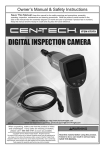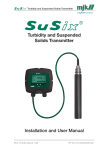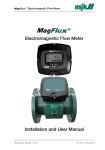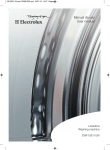Transcript
501 Manual 501 Manual 501 Manual Terminal Connections Specifications C NO NC COMMON 12 13 14 STOP 9 10 START 8 SUPPLY 1 3 COMMON Terminal 13 must always be connected to the high-level electrode. This also applies if you change from pumping out (default) to pumping in. Only here it will function as the STOP electrode. Settings for pumping out / pumping in The 501 Electrode Control is set up from the factory to pumping out (emptying). This setting can be changed to pumping in (filling) by moving a jumper inside the cabinet as shown below: 115 VAC / 230 VAC Function The transmitter generates an alternating voltage applied to the electrodes. When the liquid connects the electrodes, the current running between these is amplified and the output relay is activated. Two electrodes can be connected to the unit for the detection of one level, or three electrodes can be connected for the detection of two levels; one for start and one for stop. In cases where the liquid is in a conductive tank, or where for example a metal pipe is in constant contact with the liquid, the tank or piping can be substituted for one of the electrodes by simply attaching a wire to it and the connection housing, usually as a common contact. (see diagram top middle). 501 Manual US 081104 Enclosure Mounting 12 VDC Relay Emtying Filling Relay Materials Dimensions Filling Fuse Special Features • Price competitive and reliable system for level control in conductive liquids • The amplifier is easily mounted on a DIN-rail • The electrodes can be suspended by a cable or threaded directly to a Lexan and Noryl plastic electrode base housing with a 1” thread (see diagram at far right) • The electrode base housing can be mounted on a special acidproof MJK 316 SS sensor brackets (200219 and 200220) which can be wall mounted, pipe or rail mounted (using Universal Brackets 200205) or mounted on a wall with an extension arm (200210 plus 200215) Electrodes Description Length Fuse General The 501 Electrode Control is a simple and price competitive system for level control in conductive liquids. The system includes a transmitter for DIN-rail mounting and various level electrodes. Emtying This installation manual applies to: -209820 501 Electrode Control 115 VAC -202820 501 Electrode Control 230 VAC -202830 501 Electrode Control 12 VDC Part numbers Dimensions Mounting Power supply Consumption (relay off) Comsumption (relay on) Temperature range Materials Cover Base CE approvals Enclosure Relay output Emptying Filling Emptying Filling Supply Supply 1 3 1 3 P 0 + - Part numbers 209820 501 Electrode Control / 115 VAC 202820 501 Electrode Control / 230 VAC 202830 501 Electrode Control / 12 VDC 202850 Level electrode (19 ft cable; normally not used with electrode base) 202860 Electrode base with level electrode (1m rod) 202864 Electrode base with 4 level electrodes (1m rods) 202865 Level electrode for use with p/n 202860 (1m rod) 209820 (202820) 202830 86 x 52,5 x 58 mm (h x w x d) On DIN-rail 11-16 VDC 115 (230) VAC±10% <1mA Approx. 4VA 40mA -4°F to +140°F (-20°C to + 60°C) Lexan (grey) Noryl (black) EN50081-1, EN50082-1 IP22 Voltage-free switch (max. 250V, 4A resistive,1A inductive) 202850 202860 (64) 202865 Single Electrode base Additional electrode incl. one (four) rod for p/n electrode rod(s) 202860 IP68 IP65 IP68 Suspended in Mounted with M5 Mounted in 19.6 ft cable thread base with incl. 5.9” M5 thread electrode 5.9” / 150mm 39.4” / 1000mm 38.4” / 975mm AISI 316 POM / AISI 316 AISI 316








